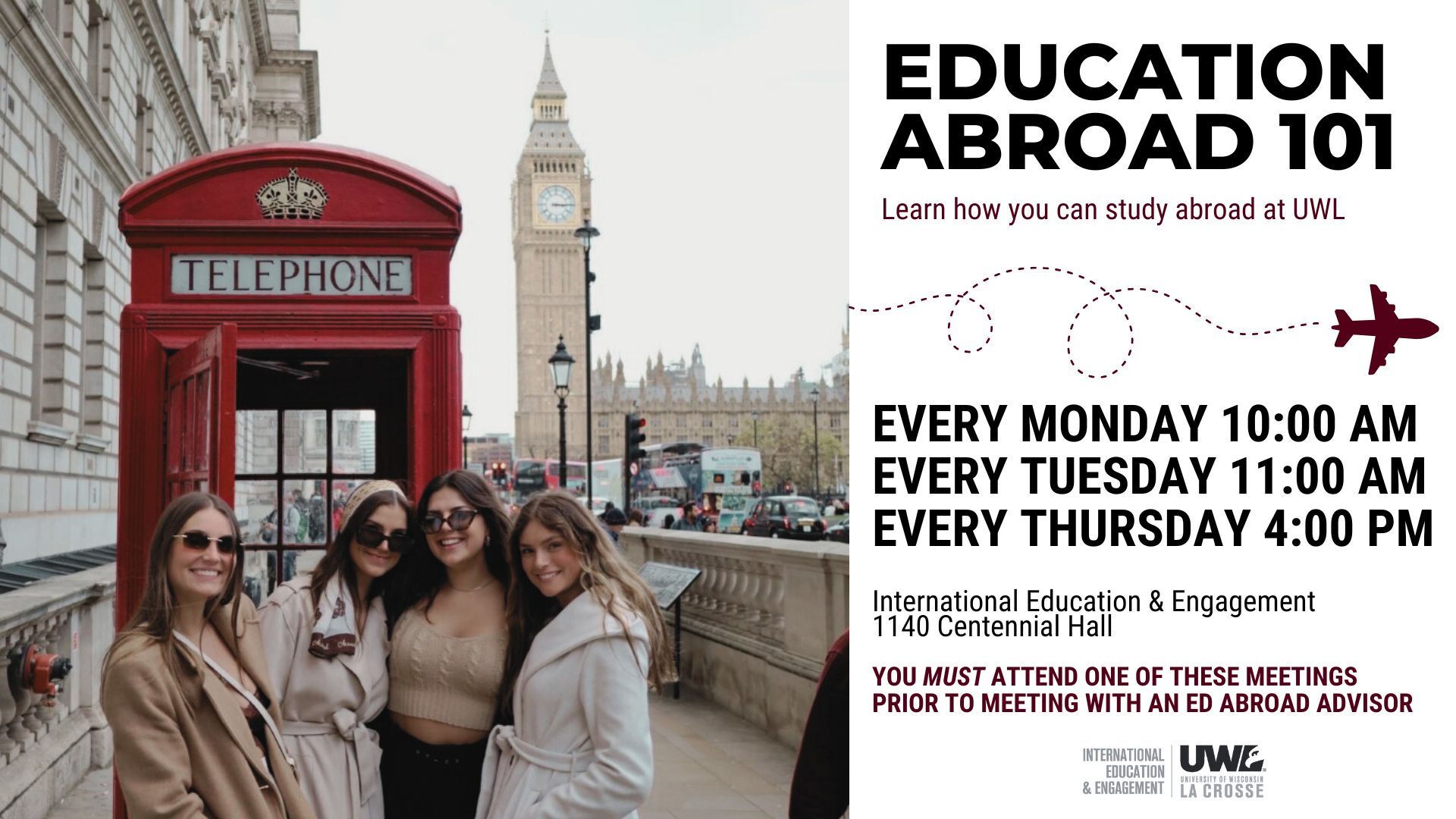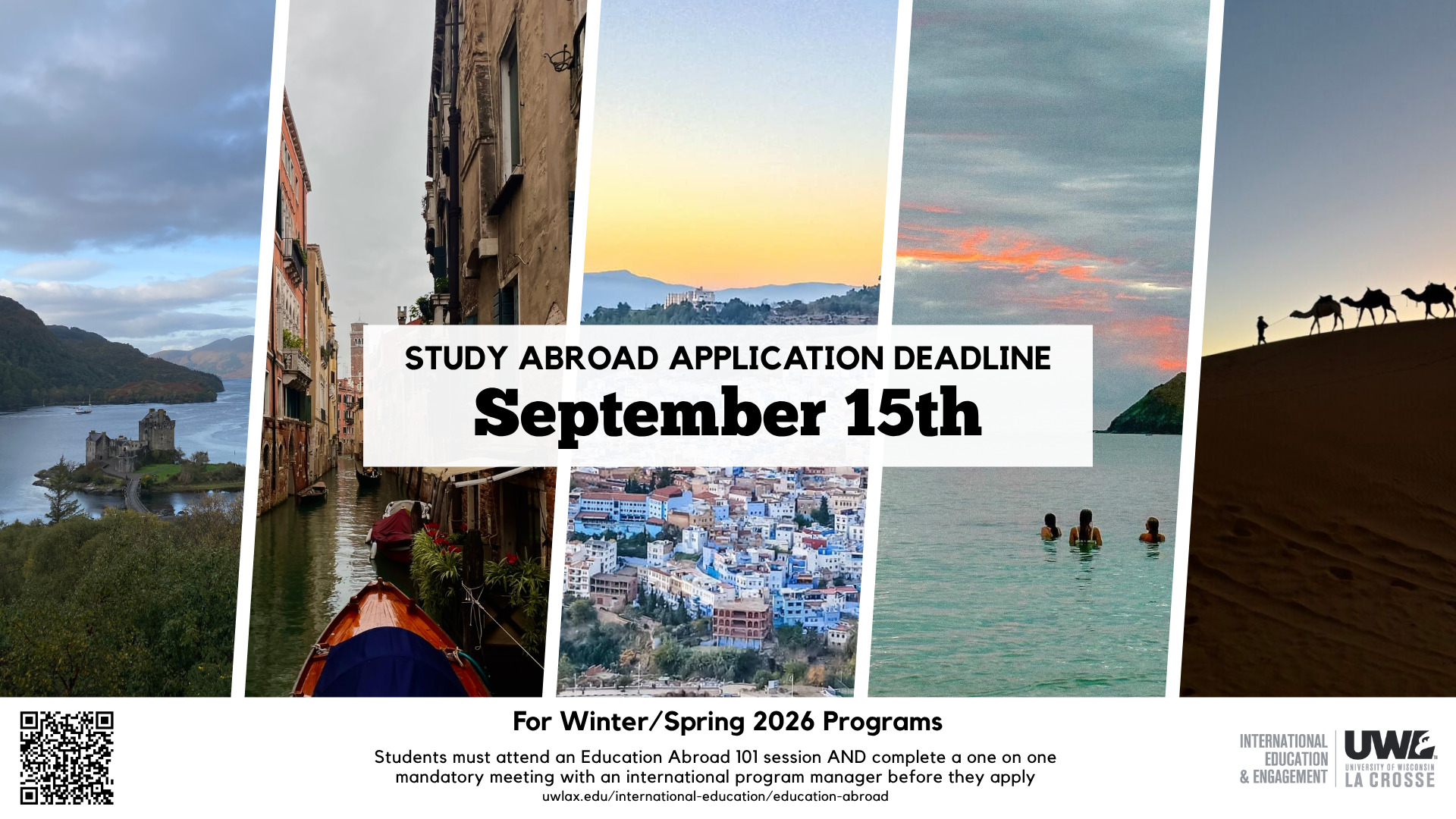Start Here: Abroad 101
A page within International Education & Engagement

Education Abroad 101
Mandatory Education Abroad 101 sessions are located in IEE (Centennial Hall 1140) on these days during regular academic days:
- Monday at 10 AM
- Tuesday at 11 AM
- Thursday at 4 PM
Attendance to Education Abroad 101 is mandatory prior to scheduling a study abroad advising appointment with a staff member. If you are unable to attend one of these sessions you must reach out to international@uwlax.edu and ask for a recording.
You only need to attend a session once.
These sessions will go over the study abroad process, explain the different programs UWL offers for study abroad, financial aid resources, how to get started, and more!
Education Abroad Benefits
Education abroad alumni and professionals as well as employers around the world agree on how beneficial an education abroad experience is for college students. Benefits go from enhancing global awareness and academic learning to developing cultural competency and personal growth. However, one of the most often cited benefit is how an education abroad experience helps students stand out when applying for a job and/or to graduate school by enhancing their resume. At UWL we strive as a community to engage in student success. As a result, The Eagle Advantage, was developed to help UWL students recognize highly valued competencies employers seek in potential candidates, and learn how to develop those competencies while in college. One way to gain the Eagle Advantage is by studying abroad!
Below, we have summarized the most noteworthy benefits of an education abroad experience as well as how those benefits will contribute to your Eagle Advantage.
Benefits Expanding
Study Abroad Benefits
According to the Association of International Educators (NAFSA), these are some key benefits of an education abroad experience:
- Enhancing Global Awareness. To be an educated citizen today requires students to understand the international dimensions of the problems we confront as a nation, and our impact in the world. What better way to gain or enhance their global awareness than through an education abroad experience!
- Enhancing Academic Learning. An education abroad experience will introduce students to new professors who can expose them to new viewpoints, and a diverse student body that will introduce them to different customs and cultures. An education abroad experience also lets them expand their academic learning outside of the classroom, because they live what they are learning.
- Developing Leadership Skills. An educational opportunity outside the United States can be among the most valuable tools for preparing a student to participate and lead effectively in an increasingly interconnected international community that demands cross-cultural skills and knowledge.
- Advancing Career. In today's increasingly global society, obtaining international skills and knowledge will make students more marketable when applying for jobs and more productive once they are working. It will also help them stand out when applying to graduate school.
- Experiencing Personal Growth. Students discover that in the process of learning about other countries and culture they end up learning more about themselves in ways that simply cannot be replicated in their familiar campus in the U.S.
- Learning Another Language. Immersion in another language through study abroad is one of the best ways to gain proficiency in a language. But even those students who are not pursuing a second language, will still benefit as they will also learn at least the day-to-day phrases to interact with the locals.
- Establishing Relationships. Students will continue to benefit, even after their return home, through the friendships they formed during their education abroad experience. Students will not only make friends with local students and professionals, but also with international students from other part of the world. Some of these connections can also help students find further international opportunities.
Benefits & The Eagle Advantage
These are some examples that will help you recognize the competencies identified in the Eagle Advantage before and during your education abroad experience, and how to articulate them to others:
| COMPETENCY | |
| Adaptability |
Most students embarking in an education abroad experience will step outside of their comfort zone. Being in a new place by yourself can be overwhelming at times, and it will test your ability to adapt to diverse situations. Just getting through the day will present challenges and require a level of adaptability. For example, adapting to:
These are just a few examples. Embracing a growth mindset approach will help you become more open-minded and flexible, and will push you to successfully adapt to a new culture and environment. |
| Collaboration & Leadership |
Faculty-led study abroad programs are entirely based on collaborating with your fellow participants, living, learning, and traveling together. Study abroad as a mutual cultural exchange experience among both study-abroad participants and local students can provider opportunities to organize, prioritize, and delegate work when, for example, planning cultural activities, programing, excursions, etc. |
| Communication |
Learning how to effectivity articulate thoughts in a different cultural style of communication (i.e. low context vs high context), or learning to use both verbal and nonverbal social cues of a new place will be a must in any education abroad experience. Enhancing language skills. |
| Critical Thinking & Problem Solving |
By living in a new country, you are very likely to see evidence for new perspectives and recognize your own biases. You will have to rely on your own and new knowledge to navigate your days. A good example is learning to navigate public transportation or figuring out how to find your way when you get lost. |
| Digital Literacy & Technology |
Through this experience, you will be exposed to various forms of digital literacy when:
|
| Engaging Diversity |
Every aspect of studying abroad requires engaging diversity and students will not only interact with students, faculty, and professionals from the host country, but also with international students from all over the world. A 2014 survey of 800 U.S. business executives, found that 75 percent of the companies indicated that a global perspective was important for their staff and 80 percent believed their overall business would increase, if more of their staff had more international experience (NAFSA). |
| Integrity & Accountability |
Responsibility to hold yourself accountable for your classes and program’s and host country’s expectations. Studying abroad means serving as a small-scale ambassador, your actions and behavior abroad will reflect your university and country. |
| Self-Management |
Studying abroad may be part of your long-term academic or career plan; therefore, you will need to self-manage this goal and communicate with the right stakeholders involved in this process. Studying abroad provides an opportunity to pursue your unique personal interests and learn more about your own strengths and limitations. |
Study Abroad Sample Resume
This sample shows different ways how you can incorporate your education abroad experience in your resume:
Study Abroad Sample Resume.pdf






















